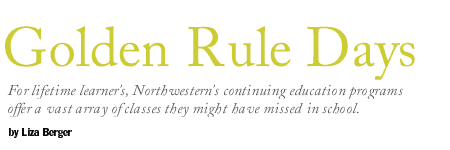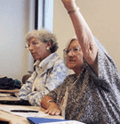

|
 |
|
 |
A group of silver-haired adults are eating lunch in the
Norris University Center cafeteria. Most are decades older than the
college students around them, but they are perfectly at ease in the
student union. "They never talk about their illnesses or their
grandchildren," says senior citizen Alice Mills. "They're still bubbling
from what they've just heard." Whoever says college is just for the young should visit one of Northwestern's three continuing education programs: the Institute for Learning in Retirement, the Alumnae of Northwestern's Continuing Education Pro-gram or the one-week Alumni College. Unlike typical Northwestern students, those who attend these programs are retired lawyers, doctors, businesspeople, teachers or, in some younger cases, parents not employed outside the home. They are also living proof that learning knows no boundaries of age or circumstance. "It gave me a place to enjoy retirement," says Mills, a former allergist who is in ILR. "It gave me the opportunity to study things I didn't have time to do in med school, raising children and practicing medicine."
INSTITUTE FOR LEARNING IN RETIREMENT Anyone who has an interest in a subject or a desire to learn about it can coordinate a study group. When people have an idea, they select a core of reading materials and submit their proposals to the ILR curriculum committee for approval. "[ILR] appeals to someone who is very inquisitive and participatory and active and wants to be fully engaged in the learning process," Reinish says. "People who come to the program are active learners." In the ILR's Writing for Your Family study group, students make a record of their memories and experiences. At each session, they share their pieces with the class, always generating stimulating discussion. Mills has written about being one of seven women in a class of 70 at the University of Illinois' medical school and about the time she brought a dissected cat home on the streetcar. What motivated her to join the study group? "I wanted to leave a record behind for my grandchildren," she says. In some cases, the literary efforts take on a decidedly sobering coloration. Joseph Hausner, who is a coordinator for the course, authored a lengthy remembrance of his experiences in Europe's concentration camps during World War II titled Inside the Cold Crematorium. Some students have their work published in the ILR Journal, a compilation of essays, short stories, original art and poetry by students that is published each November. After a juried selection, the ILR editorial board helps refine submitted pieces for publication. Hausner contributed a humorous story, The Smuggler of Dilled Pickles, based on events that occurred when he lived in Chile. Sometimes, classes beget other classes, which is encouraged. Mae Nessenson, who has been in ILR for seven years, couldn't get into a study group whose participants discuss articles from the New Yorker magazine, so she offered to coordinate a second New Yorker group with her husband. It thrived. When Donald Collins, dean emeritus of continuing education, proposed ILR to Northwestern in 1983, the idea did not spark immediate interest in the targeted audience, but the notion took hold over time. From 68 participants in ILR's first season, more than 500 now attend study groups on the Chicago and Evanston campuses. Last fall, the institute received the prestigious Outstanding Program Model Award for Older Adults from the Association for Continuing Higher Education. Collins modeled ILR after a program at the New School for Social Research in New York City. He is proud that ILR's self- teaching technique takes maximum advantage of retirees' breadth of knowledge and background. "This makes sense for individuals with decades of experience," Collins says. Hausner agrees: "It's a great pleasure to get together with people of your own age who are articulate and have nothing to prove."
ALUMNAE'S CONTINUING EDUCATION PROGRAM "Why does this group of volunteers do this - and continue to do this?" asked provost Lawrence Dumas at last fall's NU-Day, an annual Alumnae event that on this occasion celebrated the program's 30th year. "One, their love of learning, and two, their love for their alma mater - a very powerful combination." Since 1968, more than 200 professors from almost every Northwestern department have participated in the Continuing Education Program, which now offers four classes each fall, winter and spring quarter and two summer classes. Over the years, course content has spanned the educational spectrum. A quick browse of past courses includes such topics as medieval England, crime control, the history of Islam, portfolio management, contemporary music, theater offerings too numerous to mention and a host of science courses (especially popular with the men) - all taught by the best at Northwestern. Mildred Kahn, who has been taking continuing education classes since they began, has studied everything from Mao's China to art to urban studies. "One of the marvelous advantages to the program is that college-level classes are available to those who seek to broaden their horizons in a world that's changing so fast," Kahn says. "What I've learned has stayed with me and fortified me." The enthusiasm is returned in kind by the professors. Kathleen Galvin (S65, GS68, GSESP80), associate dean of the School of Speech, is a frequent lecturer who particularly enjoys the "vibrancy of the students and their strong desire for learning." When the Alumnae's program started, fewer than 100 people participated. Today, 2,000 a year enroll, which translates into a net income of $80,000 to $100,000 annually for the Alumnae. These funds are channeled back to the University as fellowships to women students and as gifts and grants to University faculty and departments. Since the group was founded in 1916, the Alumnae of North- western have raised more than $2.5 million, with more than half of the money coming from the Continuing Education Program. The latest Alumnae gift is an endowed professorship being established as part of the upcoming sesquicentennial celebration (see story on page 9). Another endowment, this one particularly meaningful to Barbara Baum Collins (J50, G71), is the Alumnae of Northwestern Scholarship for undergraduate women. Collins has been on the 55- member Alumnae Board since 1958. "The courses are for the public," she says. "Over the years, though, they've made our Northwestern scholarships possible."
ALUMNI COLLEGE Alumni College consists of a week of lectures in July by prominent professors examining a topic from an interdisciplinary perspective. A reading list is handed out before the event begins. Students have the opportunity to live in the dorms and take part in the meal plan. Unlike undergraduate and graduate courses, however, there are no tests or papers. More than 30 people attended in 1998 to hear professors from a variety of disciplines - sociology to civil engineering - discuss that year's theme, "A Civil Society." Good food, intellectual stimulation and the chance to see old classmates were some of the motivations for John (McC47, M51) and Charlotte Cain (WCAS44) Hayford to return to their 12th Alumni College. "We probably knew half the people there," says Charlotte Hayford, who took her last exam on D-Day. "It's nice to learn without papers." Al Hunter, professor of sociology, was last year's coordinator. Hunter, who has been involved with Alumni College for four years, is impressed with the caliber of students. "What is astounding is people wanting to engage in learning for the sheer sake of exploring the topic," he says. "You're dealing with people with a biography of real-world experience. They're really able to see how issues translate into their lives." For some, Alumni College is a summer vacation from the daily routine. "You can get so narrow in the 'everyday,' " says Christine Lauber (WCAS67), an accountant from Fort Wayne. "If the topic were business, I don't know if I'd come." In addition to reconnecting with old friends, Nancy Williams Cloninger (WCAS46), who lives in Little Rock, relishes revisiting Northwestern, soaking up an urban ambiance and being mentally stimulated. "I want to pick up where the world is today," she says. The topic of this year's Alumni College program, July 25-29, will be "The City," and the coordinator will be Henry Binford, Charles Deering McCormick Professor of Teaching Excellence and associate professor of history. Twice before, the Czech Republic was the backdrop for an Alumni College Abroad Pro-gram, with professors from Prague's Charles University, an institution dating from the 14th century, at the lectern. This year, Alumni College Abroad expanded to include a learning trip to South Africa and in the summer will return to Prague. There are many paths to greater knowledge and understanding, re-gardless of the age of the learner. Some paths cross geographic boundaries, others lead to explorations of one's inner map, and yet others end at the feet of the masters. All of those paths intersect with Northwestern's continuing education programs. "The fact that people are interested in lifelong education is attested to by the existence of so many programs in the Chicago area," says Barbara Collins, who revels in the classes she takes at the University. "Still, I feel that Northwestern, with all these quality op- tions, is on the cutting edge." Liza Berger (WCAS97) is a graduate student in the Medill School of Journal-ism. Kim O'Brien (S00), Northwestern editorial assistant; Lee Prater Yost, Northwestern alumni editor, and Robert Freed, Northwestern associate editor, contributed to this story.
|

|
Contact Information Those interested in obtaining more information about continuing education at Northwestern should contact: The Institute for Learning in Retirement at 847-491-7724 (Evanston) or 312-503-7881 (Chicago); e-mail: b-reinish@northwestern.edu (Evanston) or k-shenk@northwestern.edu (Chicago); or Web: www.northwestern.edu/nuilr The Alumnae of Northwestern Continuing Education Program at www.alumni.northwestern.edu/eo/continuing.htm Alumni College at 847-491-5250; e-mail: summer@northwestern.edu; or Web: www.northwestern.edu/summernu |